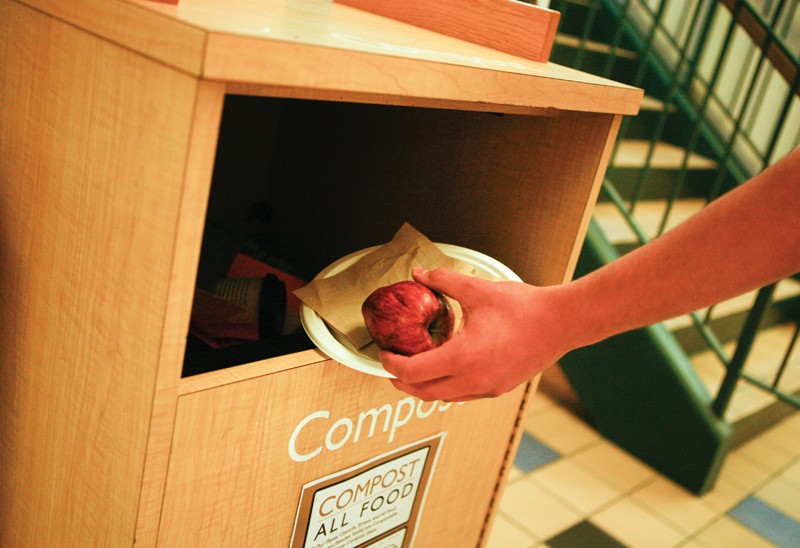Sustainability experts speak out against food waste at GV

GVL / Robert Mathews Food waste on campus.
Apr 16, 2012
As more and more fruit is flung onto the roof of Weed Living Centers and onto various art structures near Fresh Food Company, Sustainability and Campus Dining personnel at Grand Valley State University are starting to hit the roof over the amount of food that is wasted.
“It’s very disappointing to see that kind of waste,” said Deb Rambadt, marketing manager of Campus Dining. “As Campus Dining works hard to support sustainability and good stewardship, it’s unfortunate to be an unwilling accomplice to this vandalism.”
Such sustainability initiatives include recycling metal, plastic and glass, having waste sorting stations for different types of recyclable materials, participating in Recyclemania and using sustainable trash methods such as having compostable trash bags. Other initiatives include purchasing food locally, which is sustainable because it uses less fuel to deliver the food to campus.
GVSU Campus Sustainability Manager Bart Bartels said the tray-less system in Fresh Food Company cut food waste by 30 percent, but with all the efforts to cut costs and reduce impact, he said it is demoralizing to see food wasted intentionally.
“I really don’t have a problem with students taking an apple or a banana from the lunch room as long as it doesn’t go to waste, but I see students go out of their way to take food with them, just to throw it on the way home,” Bartels said. “That is insane, and it costs all of us.”
Tim Thimmesch, assistant vice president of Facilities Services, said his department has maintenance staff with student employees who pick up the fruit on the roof of Weed.
“Typically, we have to do this two or three times in the spring,” Thimmesch said. “Fortunately, [there is] no structural damage regarding this issue.”
He added that the staff and student labor to clean the mess costs $300 to $500, which does not include the cost of wasted fruit.
“In the past, Fresh Food Co. tried to replace whole fruit with cut fruit and also tried relocating whole fruit so that guests had to request it from the service attendants,” Rambadt said. “Neither were satisfactory solutions. Short of eliminating whole fruit, there doesn’t seem to be a solution and at this point we don’t want to deprive those who truly want whole fruit.”
Rambadt also said inside Fresh, pre- and post-consumer waste is composted, meaning that natural food waste generated in food production — including vegetable peelings, trimmings and coffee grounds and food waste that guests place in the appropriate waste receptacle or on the dish — return at Fresh Food Company is all entered into the composting system.
“The biggest challenge regarding food waste is educating guests to place the appropriate waste into composting [or] landfill receptacles,” Rambadt said.

























